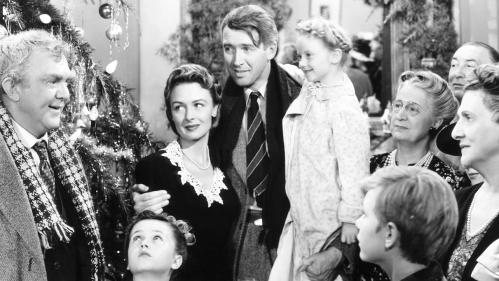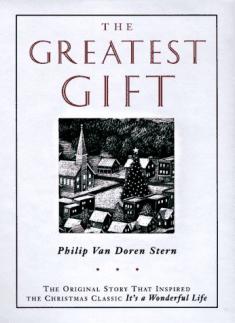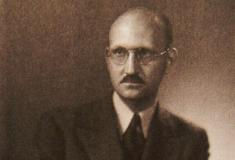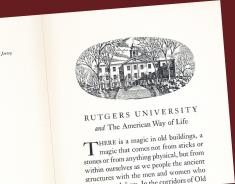
Inspiring a Holiday Classic
The Story Behind the Story
Out of a moment before a mirror came an American classic, the beloved 1946 film It’s a Wonderful Life, directed by Frank Capra, starring Jimmy Stewart, and based on a short story by Rutgers alumnus Philip Van Doren Stern. (Photo/Everett Collection)
The brainstorm struck alumnus Philip Van Doren Stern, Class of 1924, when he was shaving one morning in the winter of 1938. The unshakeable idea was a story, fully formed in his mind, about a despondent man who rejects suicide and embraces life after a mysterious stranger allows him to see how the world would be had he never been born.
Though already an author and publishing executive, Stern struggled to get the story down on paper. It took him five years to develop a draft he felt comfortable sharing with his agent. After unsuccessfully shopping it around to magazines for a few months, Stern decided to self-publish the story, called The Greatest Gift, and send it to 200 people as a 1943 Christmas card.

“One evening [a few months later], just as I arrived home, I heard the telephone ringing,” Stern recalled in a 1946 New York Herald Tribune article. “It was Western Union calling to read me a telegram from Hollywood, announcing that the story had been sold for $10,000.”
“Wow! What an Idea.”
Stern’s Christmas card had landed on the desk of an executive at RKO Radio Pictures, which bought the story as a vehicle for Cary Grant. But it wasn’t until movie director Frank Capra’s Liberty Films acquired the rights in 1945 that things really took off.
In his 1971 autobiography, The Name above the Title, Capra wrote, “It was the story I had been looking for all my life! Small town. A man, a good man, ambitious. But so busy helping others, life seems to pass him by … Through the eyes of a guardian angel he sees the world as it would have been had he never been born. Wow! What an idea. The kind of an idea that when I get old and sick and scared and ready to die—they’ll still say, ‘He made The Greatest Gift.’ ”
Capra approached Jimmy Stewart, who immediately signed on to play the lead, George Bailey, in what was now called It’s a Wonderful Life. The movie, which opened in December 1946 to mixed reviews, acknowledged Stern in the opening credits with the words: “Based on a story by Philip Van Doren Stern.” The film went on to be nominated for five Academy Awards. Today it is an American classic and is aired on NBC each December.
The original story that inspired it all is still in print. Three editions of The Greatest Gift have been published: in 1944, in 1996, and the newest edition in 2011—a replica of the original version.
A Man of Many Achievements

Stern’s own wonderful life was full of many accomplishments not related to his famous holiday tale. According to his New York Times obituary, Stern, who died in 1984, was a respected historian who authored more than 40 books, most notably Civil War accounts, including The Man Who Killed Lincoln and An End to Valor: The Last Days of the Civil War. He was an editor at Pocket Books, Simon & Schuster, and Alfred A. Knopf.
During World War II, he was general manager of Editions for the Armed Services, which resized popular books so Americans serving in the military could store them in the pockets of their uniforms. His many achievements were noted throughout the years in the Rutgers Alumni Monthly.
Stern maintained close ties with his alma mater. His daughter, Marguerite S. Robinson, says her father spoke fondly of his Rutgers days, adding that “he was the first in his family to attend college; this was a big deal.” He helped to launch the Rutgers University Press in the late 1930s, and in 1940, upon publication of what is probably his most highly regarded work, The Life and Writings of Abraham Lincoln, Stern received an honorary Doctor of Letters from Rutgers during a convocation held on Lincoln’s birthday.
Rutgers University and the American Way of Life

In 1941, on the occasion of the university’s 175th anniversary, Rutgers asked Philip Van Doren Stern to write about his alma mater. The result was Rutgers University and the American Way of Life, an essay that is as relevant today as it was 75 years ago. Here is an excerpt:
“A great university, a place dedicated to learning and to the betterment of our way of living, has ties not only with the past; it is intimately connected with the present, and it must lay its plans so as to influence the future.
"Its research furthers industry and agriculture; its graduates produce goods for the world and take on the task of training a new generation to carry on in place of the old … A university’s work is never done; completion is not within its scheme of things—it deals only in terms of continuity.”
Pamphlet is courtesy of Special Collections and University Archives at Rutgers University Libraries.

